#feminist film theory
Text
Pornography is regularly used in ways that have nothing to do with sexual explicitness. Rather, pornography is commonly understood as a form of propaganda, a representational style linked with defamation and desensitization, if not destruction. Patricia J. Williams, who thinks legally, critically, and gracefully about race, sex, and injustice, calls pornography a "habit of thinking," and one that informs all manner of abusive and exploitative attitudes and relationships. Pornography, as I am using the term, is just that, a worldview, a way of thinking and acting that sexualizes and genders domination and submission, from the bedroom to the war room, making domination masculine (even when a woman plays that role) and submission feminine (even when a man plays that role), and making both the essence of sex. By wedding sexuality to inequality, pornography conditions women and men to have a substantial investment in maintaining the oppressive status quo—again, from interpersonal relationships to international politics.
Pornography kills off, and then substitutes itself for, the erotic—the life force, the earthy and ethereal force of growth, fruitfulness, exuberance, ecstasy, connectedness, and integrity. Pornography severs eroticism from intimacy and empathy and bonds it to voyeurism and objectification (of the self and of another). It incarnates pleasure in acts of hatred. It would have all of us believe, even those of us getting the "fuzzy end of the lollypop" (Sugar/Marilyn Monroe's lament in Some Like It Hot, Billy Wilder, 1959), that without a certain measure of power and powerlessness, danger, fear, pain, possession, shame, distance, and violence there wouldn't be any "sex" at all. Of course, the simultaneously pornographic, monotonous, and erotophobic culture tends to make that true. Variously damaged, alienated, and desensitized, pornography can become what we need in order to feel at all.
Some applaud pornography because it allows access to sexual imagery and language and easily offends offensive religious morality. Yet pornography is no real alternative to systemic sex-negative morality; rather it is an intrinsic part of it. Pornography and mainstream morality both stem from and continually reinforce a worldview that first makes a complex of body/low/sex/dirty/deviant/female/devil and then severs these from mind/high/spirit/pure/normal/male/god. For both, sex itself is the core taboo. Moralism systematically upholds the taboo and pornography systematically violates it. In the complex that evolves from this absurdity, taboo violation itself becomes erotically charged. Evil becomes seductive and the good mostly boring. Without patriarchal moralism's misogyny, homophobia, demand for sexual ignorance, and sin-sex-shame equation, pornography as we know it would not exist. And, together, the two work to maintain the sex and gender status quo.
—Jane Caputi, "Goddesses and Monsters: Women, Myth, Power, and Popular Culture."
#jane caputi#feminism#radical feminism#radblr#radfem#women against pornography#anti-porn#feminist film theory
233 notes
·
View notes
Text
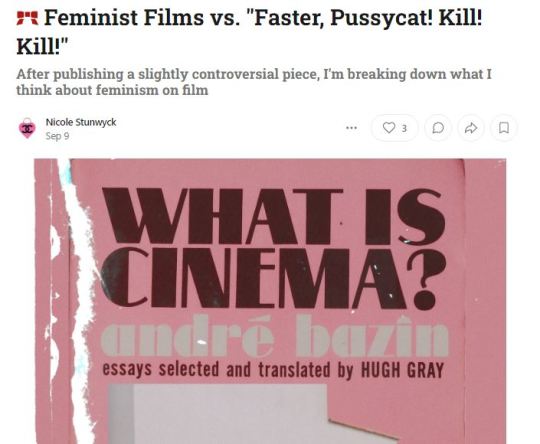


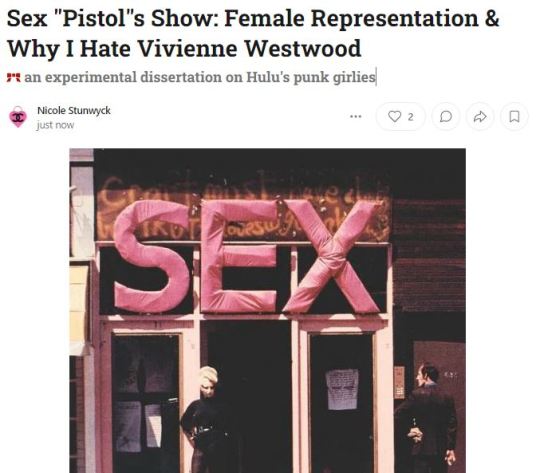
hi! i'm nicole, lady film writer & madonna scholar & blond blogger about town and these are some of my writings 🎀 all of my feminist film essays and posts r 100% free on substack and i publish a new piece weekly so consider subscribing! below some links <3 #BRINGBACKBLOGGING
Sex "Pistol"s Show: Female Representation & Why I Hate Vivienne Westwood
🎀 Feminist Films vs. "Faster, Pussycat! Kill! Kill!"
💝 5 Short Films I Recommend
the horrors of making movies as a schoolgirl 🎀
Barbie Breakfasts in Gregg Araki’s "The Living End" (1992) 🎀💝
#would mean the world if u reblogged </3#pamela rooke#feminist cinema#feminist film theory#sex pistols#pistol 2022#gregg araki#feminist film writing#woman directors#film writing#film writer
19 notes
·
View notes
Quote
Because I am a female director, but more because I am a woman, I have always been concerned with the representation of a female self in my works, life, and profession.
Zhang Nuanxin
2 notes
·
View notes
Photo
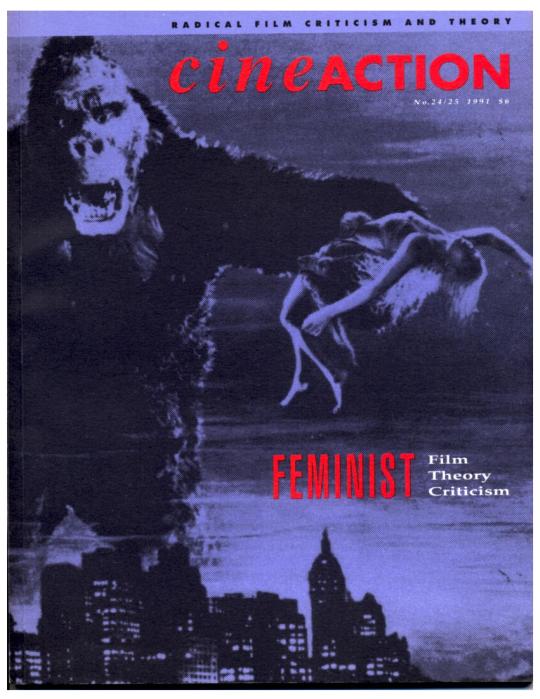
Cineaction no. 24/25 1991
#King Kong#Fay Wray#cineaction#cineaction magazine#cinema#film theory#feminist film theory#radical film theory#film criticism#feminist film criticism#le gothique féminin#damsel in distress#q
2 notes
·
View notes
Text
I wish Hollywood didn’t show women making an effort to be romantic to men who reject them and then they end up with that shitty man. It reinforces this idea that men are unaware of the emotional consequences of their actions and allows them to avoid responsibility for treating people as disposable.
Men are allowed to be flawed, struggle morally, cause harm, and then overcome that without ever doing the internal work to become a better person. Because men have inherent value and if a man has to consider that he acted in an unethical way, that means his value is less (this is specifically about America’s prison slavery system and it’s ’othering’ of groups like women, poc, lgbtq, disabled). Men have inherent value and they can struggle without that value coming into question.
Women can NOT make mistakes. Because they do NOT have inherent value. Women are valuable on a conditional basis. Can you (as a women) provide sex, companionship, validation, housework, children? If you stop providing these things or are unable to provide certain things a women’s value goes down.
This is why women have to answer for their actions while men only have to answer for their intentions.
Back to the Hollywood trope- women are shown as having romantic daydreams and wanting those dreams to materialize. They try to encourage or support the man in carrying out those dreams (do you remember what day it is, honey?). This doesn’t go well and we as the viewer are encouraged to side with the man.
Be clear in your message = the woman’s actions are judged as most important.
The man was tired or there were other external factors = the man’s intentions are judged as most important.
This is bad because it encourages men to act as if there are no consequences to their actions as long as they mean well. It’s bad because it teaches women that men should not be judged for their actions. It’s bad because it encourages certain people to treat others poorly and another people to accept poor treatment.
Women who do not receive reciprocity in their romantic efforts should cease all romantic efforts with that person. GIRL there are millions of people out there one of them will treat you right. Stop trying to teach a man how to treat you.
#feminist film theory#feminism#media studies#hollywood#women and gender studies#men need to do better and media that cops for them is bad#men shouldn’t get the girl#American centric cause I’m an American and that’s where my studies are from#ymmv if you are not American or from a patriarchal society#the audience is supposed to identify with the man because they have personhood#intersectionality ABSOLUTELY applies but i run off the assumption that we’ve already deconstructed whiteness
0 notes
Text
I feel like the thing Mulan (1998) accomplished better than any other Disney ‘princess’ film was how her society valued women based off 1. their attractiveness and 2. their ability to be submissive.
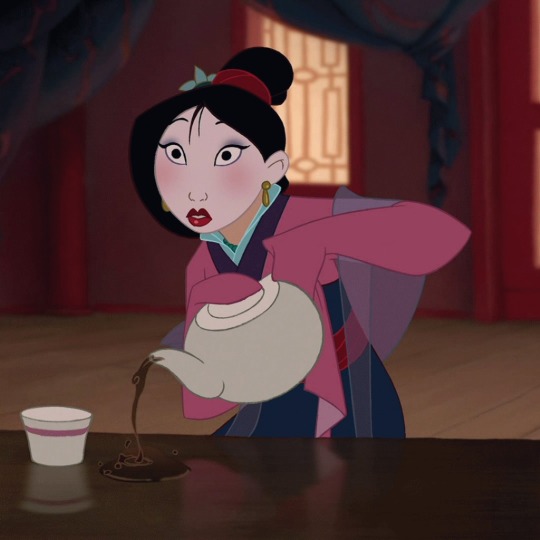
Other Disney movies (ex. Beauty and the Beast) make references to the misogyny women face for being unable to fulfill traditional female roles, but the disgusting standards aren't explored nearly as much as they are in Mulan. The entire song “You'll Bring Honor to Us All” focuses on all these horrible beauty standards she is expected to uphold:
“With good breeding/ And a tiny waist”
“Like a lotus blossom/ Soft and pale”
“a perfect porcelain doll”
But the song also reflects the social status of women and their roles in society:
“Boys will gladly go to war for you”
“A girl can bring her family/ Great honor in one way/ By striking a good match”
“Men want girls with good taste/ Calm/ Obedient/ Who work fast-paced”
“A man by bearing arms/ A girl by bearing sons”

Mulan’s reflection of this caricature she is meant to become is so much more powerful and sticks out even compared to other more recent Disney movies (Frozen, The Princess and the Frog, etc.)
I personally feel like Mulan is the only ‘princess’ who does not fall into the society's expectations of feminity in come category. She does not seek to become an object, and she defies the roles her society wants her to uphold. Mulan is the only Disney film that shows the impossible standards women are given. The only film that comes close to this would be Brave.
#Disney films#disney princess#mulan#hua mulan#mulan (1998)#feminism#feminist#feminist theory#gender roles#gender theory#oppression of women#radical feminism#radical feminist#radfem#libfem#liberal feminist#liberal feminism#intersectionality#intersectional feminist#intersectional feminism#beauty standards#asian feminism#chinese feminism#asian beauty standards
3K notes
·
View notes
Text
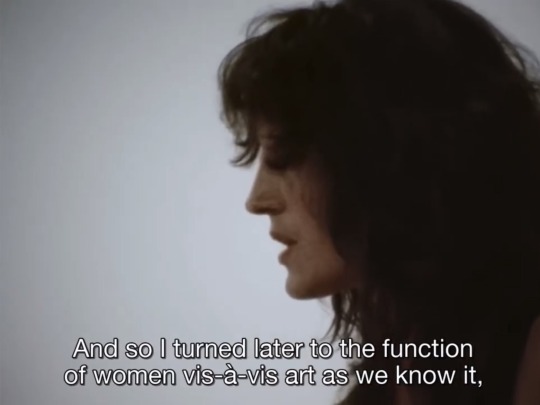
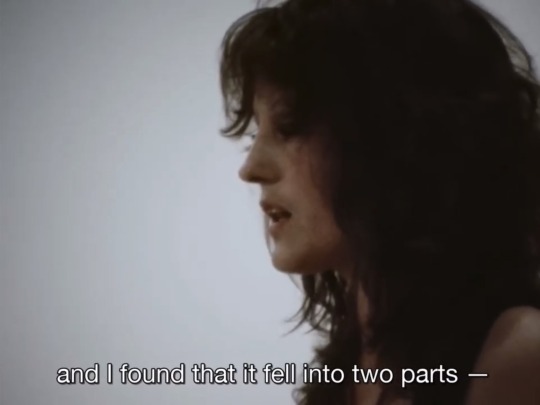
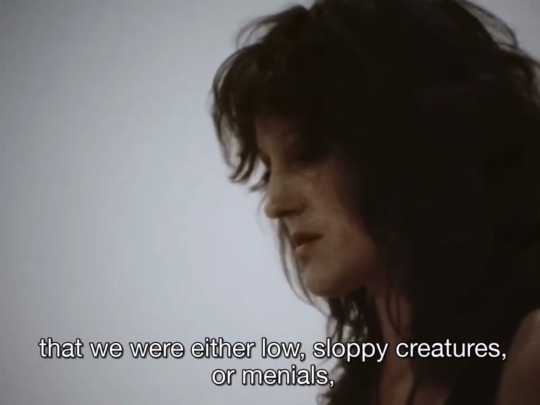
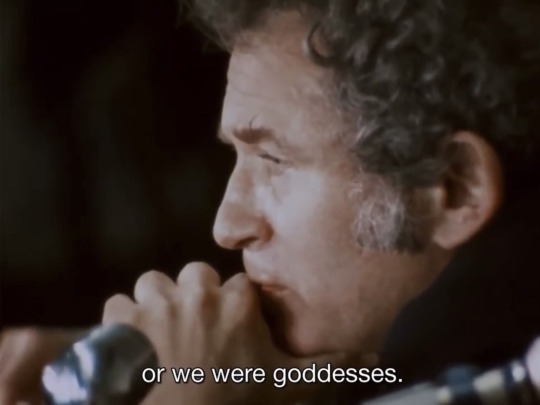
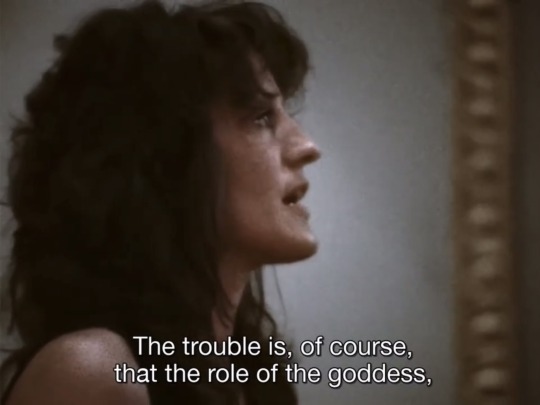
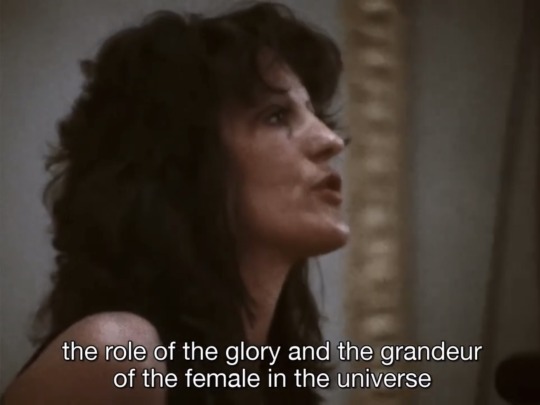
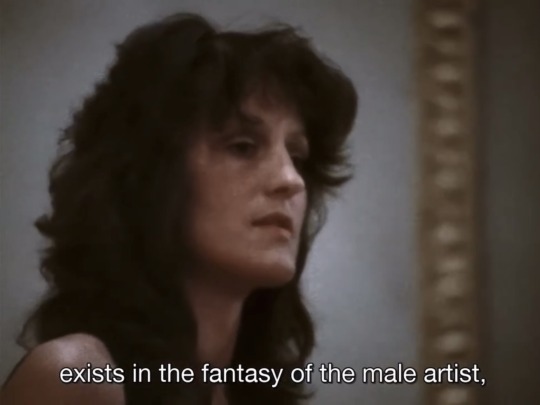
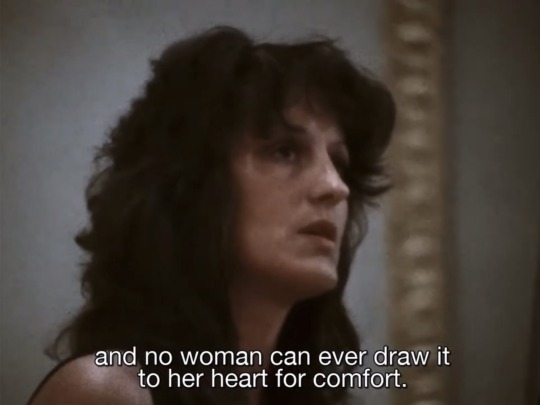

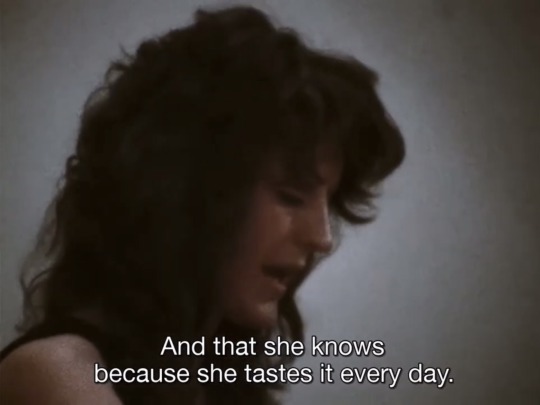

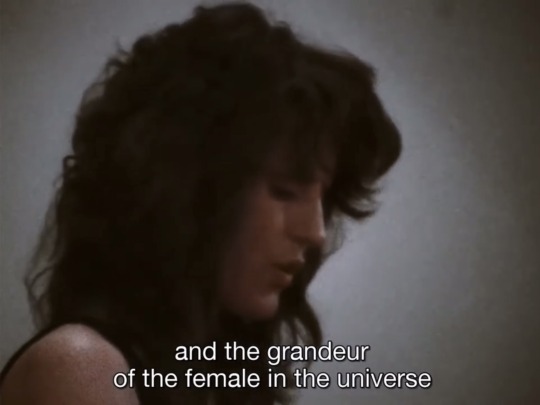

Town Bloody Hall (1979) | dir. Chris Hegedus, D. A. Pennebaker.
#1970s#germaine greer#films#*#directed by women#feminism#female directors#feminist movie#documentary film#60s 70s 80s 90s#70s movies#1970s movies#feminist#feminist film#screencaps#documentary#movies#vintage#quote#film quotes#movie quotes#radical feminism#radfem#radical feminist safe#radical feminist community#radical feminst#radblr#radical feminist theory#feminist media#radical feminists do interact
116 notes
·
View notes
Text
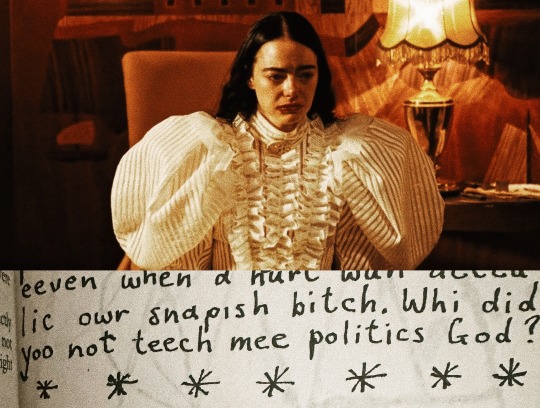

people launching discourse on this scene being "overdone," "problematic," and misperceiving it as the film trying to state injustice existing as a wild, deep concept have just lost the whole plot. the film is told through bella's eyes as it is BELLA'S story and she had lived a sheltered life that, while no fault of her own, was in part due to being white and wealthy and in part because god confined her to his house. the point? it is meant to be an immensely dramatic scene because that is BELLA'S poignant, indignant reaction to the realization that injustice exists. her heart is destroyed. this is a GOOD thing in the sense that she ... you know ... truly cares about systemic oppression. it would be disheartening to see her act indifferently as those around her do.
indeed, she has what we'd call "rich white lady" guilt and her naïveté leads her to initially believe that throwing money at the problem will solve it, which, while good-intentioned, obviously will not solve things. this clownish behavior, again not an insult to bella as she doesn't know better, is intentionally presented that way to comment on the ridiculousness of that typical white saviour mentality from people who are in fact aware of injustice and simply do not choose to educate themselves on how they can meaningfully contend it because they do not care. bella, however, upon finding that it's not that simple, is committed to finding ways that actually do help. the witnessing of the slum was her moment not just of "growing up" from a sheltered life but of radicalization, which ultimately leads her to socialism and the finding that deconstructing oppressive systems is a collective effort. read: the scene isn't "poverty porn" but rather a wake up call and one of action for bella given she is a good-intentioned being. her impetus to effecting actual social change. she couldn't do this if she didn't even know it existed.
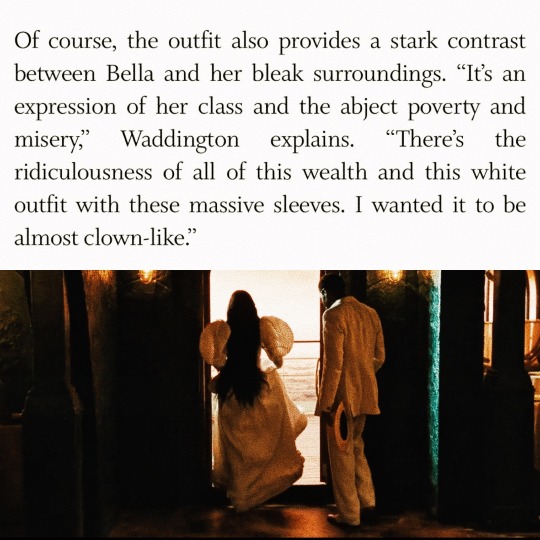
i am perpetually shocked at people's proclivity (perhaps propensity but it seems to be a common phenomenon to hop on a hate train) to misperceive this film, in so doing acting in a petulant, unhelpful way that the film critiques, but i digress.
#emma stone#film#poor things#yorgos lanthimos#bella baxter#film theory#feminist film#white saviorism#media illiteracy#holly waddington#social commentary#alasdair gray
45 notes
·
View notes
Text
Trying to read an article/essay/book about film/literature theory especially in regards to gender:

#hes everywhere!! i cant escape him!!#but sometimes hes right which makes it worse#but also i get it like its not the fault of this feminist from the 70s that freud is the most prevelant voice#in psychoanalytics esp in regards to gender and the subconscious#but sometimes i wish he wasnt#film posting#film theory
21 notes
·
View notes
Text
In a key scene in Red Dragon, an FBI agent tells a group of police officers that there is no doubt that the family serial killer will strike again. “Why?” one woman asks him. “Because it makes him God,” intones the agent. Just days after Red Dragon opened, the police found the Death card from a Tarot deck near the scene of one of the shootings. Inscribed on the card was a message from the shooter. It was reported in the media as reading: “Dear Policeman, I am God.”
Such grandiose allusions to divinity have long been a crucial part of the serial killer myth. They proliferate as well in technological, especially nuclear, mystique and metaphor, most famously when the erudite J. Robert Oppenheimer, “father” of the atomic bomb, named the bomb test site “Trinity” and then, while witnessing the first atomic blast, recited the god Krishna’s words from the sacred Hindu text, the Bhagavad-Gita: “I am become Death, the shatterer of worlds.”
More mundane occasions for such utterances occur regularly in popular playtimes. In the media storm that followed the discovery of the inscribed Tarot card in the Beltway case, the public learned that “I am God” is a common declaration by victorious players of violent video games. We were reminded that Eric Harris, one of the two teenaged boys who committed mass murder at Columbine High School in April 1999, was an avid video game player and had scribbled, “I am God” in another student’s yearbook.
The popularity of this phrase in all of these contexts points to a pervasive, if usually unexamined, recognition that violence, control, total power over others, and specifically masculine lethal violence or the power of “unnatural death,” all have a religious character in our culture. Despite much talk of God being “love” and associated with creation, the phrase “I am God” is not uttered in delivery rooms by mothers, or by those getting the news that they have received the Nobel Peace Prize. The dominant notion of god in the Abrahamic patriarchal religions is an all-male being whose defining characteristics seem to be omnipotence, jealousy, righteousness, judgment, and dominance. This notion of god powers all sorts of terrorism: religious, political, criminal, familial, militarist, nuclear, and any combination of these as power-mad men take up that mythic role, “playing god” by waging war, accumulating fortunes, toying with others’ lives, and lording it over everybody else.
—Jane Caputi, "Goddesses and Monsters: Women, Myth, Power, and Popular Culture."
47 notes
·
View notes
Text
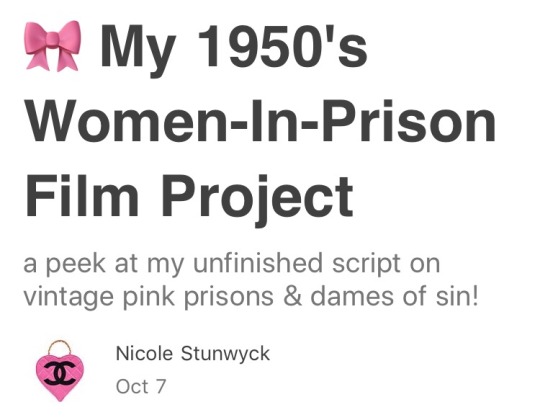

Read my new substack post about how I’d direct a 🎀 women-in-prison 🎀 genre movie by mixing it with 50’s burlesque aesthetics!
2 notes
·
View notes
Text
The Watchlist: Feminist Films
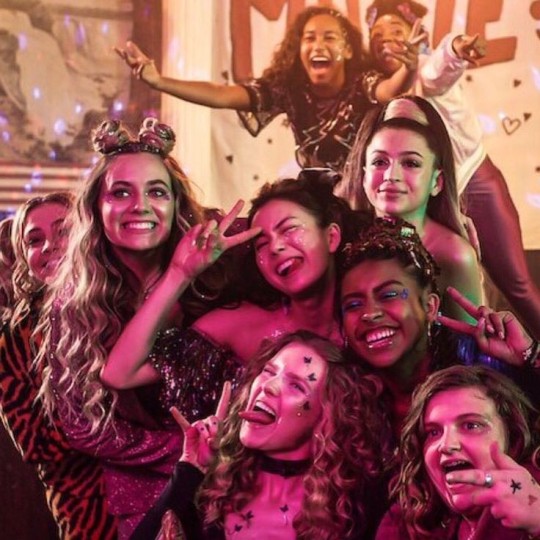
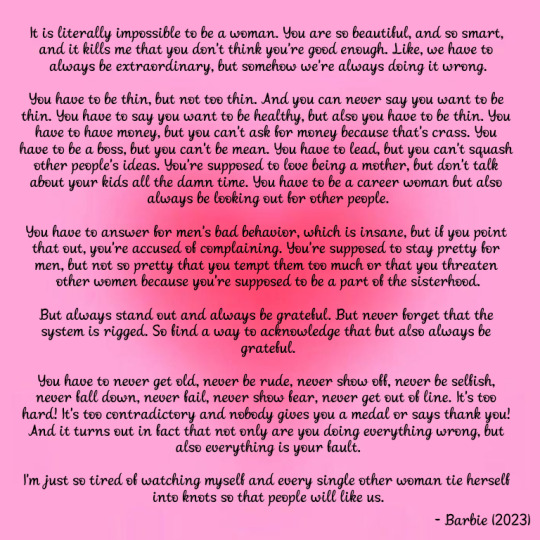
His Girl Friday (1940)
The Color Purple (1985)
10 Things I Hate About You (1999)
Erin Brockovich (2000)
Miss Congeniality (2000)
Legally Blonde (2001)
Frida (2002)
Kill Bill Vol. 1 (2003)
Kill Bill Vol. 2 (2004)
Pride & Prejudice (2005)
Persepolis (2007)
Brave (2012)
The Punk Singer (2013)
Suffragette (2015)
He Named Me Malala (2015)
Hidden Figures (2016)
Moana (2016)
Battle Of The Sexes (2017)
Wonder Woman (2017)
Little Women (2019)
Portrait Of A Lady On Fire (2019)
Miss Americana (2020)
Enola Holmes (2020)
Moxie (2021)
She Said (2022)
Barbie (2023)
#feminism#feminist films#feminism is for everybody#feminist#intersectional feminism#feminist theory#feminist film list#film list#film recommendation#films#movie#movie list#movie rec list#movie recommendation#movie recs#film recommendations#punk rock feminism#riot girl#riot ghoul#riot grrrl#feminist fiction#women's history#women's rights#women#suffragette
41 notes
·
View notes
Text
Hey remember when I mentioned I was trying to find a place to publish my 12 page essay on Bones and All? Well I finally did it and by did it I mean put it in a blog post on medium! I’m linking it below:
#bones and all#bones and all essay#luca guadagnino#bones and all movie#film analysis#meta analysis#cannibalism#essay writing#essay#feminist analysis#queer theory#queer film analysis#postmodernist feminist theory#feminist theory#queer film#eucharist#cannibalism as sex#cannibalism as a metaphor for love#cannibalism as the Eucharist#not not tlt#not tlt
6 notes
·
View notes
Text
.
#so#maybe a week ago#there was a post about the doll commercial movie on my dash#and it was about how yeah the movies feminism was like 101 babys first feminism#because the audience it was aimed at arent people who have read feminist theory#so of course it was just The Basics#so that critique of it wasnt really valid or whatever#kinda like the ''are you trying to buy ice cream at the hardware store?'' idea#but more ''why are you trying to sell ice cream at the hardware store?''#and the post annoyed me but im a mature adult who does not have the energy to get into fights on tumblr so i just scrolled past#and i was trying to parse through the annoyance to figure out why it annoyed me so much#and i was thinking ''did it annoy me because i was in this post and i didnt like it?''#but i kept coming back to the two references to native americans in the film and how both were insensitive#one being the comparison of the kens implementing patriarchy to barbieland to the smallpox blankets and hence the wider genocide of natives#and the other being the barbie version of mount rushmore which you know was settlers desecrating the black hills which legally belonged to#natives and was a sacred mountain (going off memory i think the sioux the cheyenne and the lakota people all had claim)#and it was thinking about thst mixed with watching a leftist youtuber cover a prageru video that i realised why that post annoyed me so much#BECAUSE#the criticism wasnt just that the feminism in it is babys first feminism with the training wheels on#(which i also still kinda have a bone to pick with tbh but thats another post for another day)#a major part of the criticsm of the films feminist themes is that they were white feminist themes#the entire film was from the perspective of a white audience#the film was assumedly white if that makes any sense#like barbie is just Original Barbie because she just is. she was the first one and everyone came after her#at no point is her whiteness even acknowledged let alone explored#the film explores things like beauty standards and workplace misogyny and motherhood and the patriarchy in general but it dares not even#tiptoe around race. it just blatantly ignores it the way second wave feminism did. and oh does that coincide so unfortunately with the kens#strike back plot which lowkey perpetuates the myth that giving equal rights to an oppressed group will lead to them oppressing you#the lens from which the film views the world is one of whiteness and ignorance and privilege. white feminism is not feminism 101#basic feminism should not exclude women of colour.
4 notes
·
View notes
Text
Breaking Down the Bold Finale: Why Promising Young Woman Nailed It
Hey, fellow film lovers! Promising Young Woman (2020) is one of my all-time favourite movies and for good reason. It discusses important topics about society and femininity.
Let’s dive into the jaw-dropping finale of Promising Young Woman. Buckle up for a chat about film theory and why that ending is a knockout.
Feminist Film Theory: Power to Cassie
In the realm of feminist film theory, Cassie is our unapologetic protagonist. She emerges as an avenging hero, shattering the conventional narrative. The ending? It had to be bold, reflecting Cassie’s relentless pursuit of justice.
Cassie, portrayed with depth by Carey Mulligan, challenges the typical female character arc. The tension and power dynamics unfold in scenes where she confronts her targets.
The ending becomes a powerful statement. It breaks away from traditional gender norms. The ending also offers a fresh perspective on justice in the face of sexual assault.
Genre Deconstruction: Twisty Turmoil
Now, let’s talk about genre deconstruction. Promising Young Woman begins as a dark comedy. Before long, it morphs into a thrilling tragedy. Why? To keep us on our toes. The ending is unconventional because life itself is messy, and so is this story.
The film’s ability to blend dark comedy with thriller and tragedy is intentional. Shaking up genre expectations makes us question our assumptions about justice and morality. The ending isn’t neatly packaged, but a deliberate departure from the expected.
Visual Language: Colors Speak Louder
Have you noticed those dreamy pastel colours during Cassie’s confrontations? These pallets act as eye candy AND visual storytelling. The ending needed to be a spectacle.
The filmmakers used colours to challenge societal perceptions and scream empowerment. Pastel colours in confrontation scenes add layers of irony. The pallet challenges traditional notions of femininity.
This visual language enhances our understanding of the film’s themes. It adds depth to the ending, making it an interplay of satisfaction AND discomfort.
Dialogue as Subtext: The Unsaid Speaks Volumes
Cassie’s exchanges, especially with characters like Ryan, are dripping with subtext. The coffee shop confrontation? It’s a dialogue masterpiece, wrapping up Cassie’s journey with emotional weight.
Film theory teaches us that dialogue isn’t just about words. It’s also a hidden treasure trove of meaning. We can especially focus on lines leading to the film’s climax.
Let’s talk about THAT line in one of the ending scenes, where Cassie shows up as Candy.
Al Monroe: It’s every man’s worst nightmare, getting accused of something like that.
Cassie: Can you guess what every woman’s worst nightmare is?
Now that’s a kicker.
Al Monroe, played by Chris Lowell, reveals a common sentiment among men. He expresses fear at the thought of a woman accusing him of a heinous act.
Cassie’s retort brings the film’s feminist themes to the forefront. It challenges Al and, by extension, the audience.
Men may fear false accusations, but women live with the constant threat of sexual assault. They face the fear of no one believing them or taking them seriously.
Cassie’s response is a stark reminder of the gendered nature of societal fears. Her line put a spotlight on the systemic issues surrounding sexual assault. These types of lines prompt viewers to confront the disparity in societal expectations.
Cassie’s question is a rhetorical challenge, urging the audience to reconsider their ideas. The line encourages the viewers to empathise with the lived experiences of women. This dialogue lingers, forcing viewers to confront uncomfortable truths about sexual assault.
Catharsis and Disquiet: Emotional Rollercoaster
As we approach the finale, that mix of satisfaction and disquiet isn’t accidental. Film theory says it’s purposeful. The ending brings catharsis, a release, but it also nudges us to question more. It’s a rollercoaster designed to make us think.
The emotional impact of the ending is intentional. It prompts us to reflect on our own expectations and biases. The ending pushes us to confront uncomfortable truths about justice and societal expectations.
The film doesn’t spoon-feed us a tidy resolution. Instead, it leaves us with a cocktail of emotions. It sparks conversations long after the credits roll.
A Cinematic Rebellion
In a nutshell, Promising Young Woman chose its ending for a reason. Feminist film theory empowered Cassie. Genre deconstruction kept us guessing. The visual language uses colours to challenge norms. Dialogue spoke volumes.
The ending delivered catharsis and disquiet, leaving us with thoughts to ponder. This film isn’t just a movie. Promising Young Woman is a conversation starter. This film challenges norms and sparks discussions about justice and revenge for women.
That’s why the ending had to be a spectacle.
Promising Young Woman shows a cinematic rebellion against the norm. Through feminist film theory, genre deconstruction, visual language, and dialogue analysis, the film crafts an ending as bold as its protagonist.
#my writing#creativepotatowrites#writeblr#promising young woman#promisingyoungwoman#filmblog#filmessay#movie#film blog#film essay#feminism#feminist theory#film theory
2 notes
·
View notes
Text
OKAY SO. NEW CALIGARI ANALYSIS TIME
my brain is absolutely SPINNING right now but something just clicked here.
so, with the nature of cesare and caligari's relationship, despite how imbalanced and one-sided it is, caligari is dependent on cesare to confirm his status as "caligari." I've talked before on how he redefines cesare's identity through the use of naming, but because he needs a "cesare" to be "caligari," this is the one area in which cesare holds power over him- without him, caligari cannot assume the identity and power he wants to possess. caligari wants to define both their roles by taking possession of cesare and changing his name.
now, consider jane and francis. if francis and caligari are narrative parallels, and cesare and jane are narrative parallels, we see this same concept mirrored with the idea of marriage. francis wants to marry jane, and in doing so, her last name would be changed to his, whatever that may be. through being married, she would assume a different identity than the one she has in the film. as she is kept "single," she is defined by her role as the object of desire for everyone else, but marriage would change that aspect of her character. if francis were to change her last name through marriage, like cesare, the changing of a name would mean the changing of identity. it would enforce a power dynamic- perhaps not of the abusive nature of cesare and caligari's, but one defined by gender roles and social expectations- in both situations, the "active" member of the dynamic seeks to change the "passive" character's name- although of course, both jane and cesare attempt to challenge their passivity.
we can take this idea of naming and relationships a step further to analyze it through a queer lens. if, in a traditional heterosexual marriage, the man changes the woman's name, we see cesare once again as an "in-between" of, among many concepts, the masculine and feminine; it is his name and identity that is being changed. and consider the relationship between francis and dr. olsen, who partner together to solve alan's murder. through marrying dr. olsen's daughter, francis would be changing her father's last name to his own. jane, if she were to marry francis, would take on a transactional shift in identity, from "dr. olsen's daughter" to "francis' wife" as defined by last name. Look at how francis refers to jane at the beginning and end of the film- "that's my fiancee," "won't you be my wife." through marriage- and the changing of names- he would be changing her identity, but also his own. jane never agrees that she is francis' fiancee- like cesare, she is assigned an identifying role without consenting to play it.
and that brings us back to "we queens are not permitted to answer the call of our hearts." this line is so, so interesting to me because it's a rejection of francis' proposal- but also can be interpreted as jane's own self-awareness of her forced passivity (like cesare's) in the story. the line does not specify what the "call of her heart" is, just that she is prohibited from answering it. but through this admission of a lack of autonomy, there is also an assertion of agency; she rejects francis' proposal, and therefore the idea that the "hero" wins the "damsel". rejecting him also suggests a rejection of his name- and his ability to change her identity, as well as an awareness that she is in a passive position that she did not choose for herself. cesare, likewise, rejects his role as "monster" at the end by appearing completely harmless, contributing to the suggestion that francis is delusional.
#the cabinet of dr. caligari#silent films#film analysis#long post#analysis#queer theory#feminist theory
6 notes
·
View notes